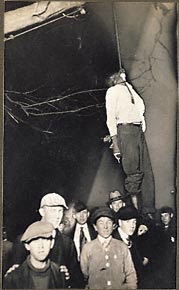 A couple of years ago, I was able to view the New York Historical Society's extraordinary exhibit of postcards, collected with singleminded purpose by James Allen, of lynchings, mostly, of course of black men and boys.
A couple of years ago, I was able to view the New York Historical Society's extraordinary exhibit of postcards, collected with singleminded purpose by James Allen, of lynchings, mostly, of course of black men and boys.
This collection is now online at Without Sanctuary with deeply moving narration by the collector, including stills as well as a narrated movie.
These postcards bear witness to an almost unthinkable capacity for pride, enjoyment and sense of moral righteousness of the the men, women and children in the mobs that surged to kill, in many cases by burning, castrating, cutting off ears, whipping, and finally hanging.
The unholy center of the photographs is the hanging body, but the action is in the faces of the crowds and the eagerness of the photographers to shoot, print and quickly sell these dark souvenirs. Many senders noted where they were standing in the picture. With self-satisfied pride of doing justice. As the psychologist William James wrote: “for all sorts of cruelty, piety is the mask," quoted in an on-line CrimeLibrary history of lynching.
Where the verb "lynching" came from is the subject of some controversy. One story has it that a slave owner named Willy Lynch gave a speech to white slave owners over 300 years ago exhorting them to dominate their slaves with cruelty, fear, and dividing and pitting negro against negro. This cruel and heinous speech as the origin of the word is debunked by other sources and not mentioned in more mainstream coverage.
Spellman College historian William Jelani Cobb says the Willie Lynch speech emerged fron the wellsprings of the internet a few years ago, and points out the many neologisms -- like self-refueling, for example -- and concludes that "There are many problems with this document — not the least of which is the fact that it is absolutely fake."
An on line etymological dictionary ascribes the word to a William Lynch, an 18th century magistrate who organized a vigilance committee to keep order in Pittsylvania, VA during the Revolution.
A more scholarly review of lynching can be found in the curriculum of the on-line course, The Negro Holocaust, offered on line by the Yale-New Haven Teachers Institute. Other historical analyses are worth looking into, including a post from Long Island University.
In the end, these gruesome postcards not only bring us into the realm of the immediate and universal grip of tragedy and grief, but also call us to look deeply into the social forces and follies that pitted so many angry whites against people they had already beaten down, convicting them without any humanity or law.
Thursday, January 3, 2008
Where Did the Word "Lynching" Come From?
Posted by Chris Forbes at 11:49 PM
Subscribe to:
Post Comments (Atom)

0 comments:
Post a Comment